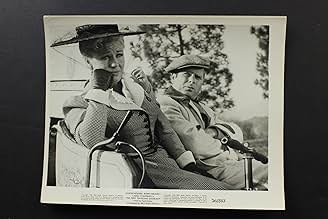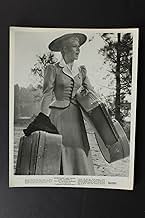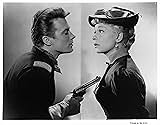अपनी भाषा में प्लॉट जोड़ेंIn the late 1800s, 2 east coast sales ladies decide to stop selling corsets and head West to sell barbed wire to Texas cowboys but they face opposition from big ranchers who fear that steel ... सभी पढ़ेंIn the late 1800s, 2 east coast sales ladies decide to stop selling corsets and head West to sell barbed wire to Texas cowboys but they face opposition from big ranchers who fear that steel wire would hurt cattle.In the late 1800s, 2 east coast sales ladies decide to stop selling corsets and head West to sell barbed wire to Texas cowboys but they face opposition from big ranchers who fear that steel wire would hurt cattle.
- निर्देशक
- लेखक
- स्टार
- Cal - Texas Rancher
- (as Robert Simon)
- Pedestrian
- (बिना क्रेडिट के)
- Cattleman at Desk
- (बिना क्रेडिट के)
- Cattleman
- (बिना क्रेडिट के)
- George the Headwaiter at Muehlebach Hotel
- (बिना क्रेडिट के)
- Courtroom Spectator
- (बिना क्रेडिट के)
- Indian
- (बिना क्रेडिट के)
- Courtroom Spectator
- (बिना क्रेडिट के)
- Mrs. Bronson
- (बिना क्रेडिट के)
फ़ीचर्ड समीक्षाएं
Unfortunately, the film doesn't offer much to Ginger Rogers in the way of an colorful role to play. She was a much better actress that deserved better than this Rose Gillray, the corset maker turned barb wire saleslady. Barry Nelson is the man who believes in the future of the automobile and whose path to California keeps meeting Rose in the most unlikely places. Ms. Rogers and Mr. Nelson don't show much chemistry between them, and probably this is where the film fails, something than with another director, could have been solved, but which Mr. Lubin ignored.
The film offers performances by Carol Channing, a Broadway star that never made it big in the movies. She plays Molly, Rose Gillray's assistant. In fact, she has the best lines in the film. A young Clint Eastwood is seen as Lt. Jack Rice, a member of the Rough Riders that Rose and Molly meet at the hotel. James Arness, another television idol, plays the rich landowner Joel Kingdom. Lastly, David Brian, an actor that tended to be seen in heavy roles, makes a good appearance as James Carter, the barb wire manufacturer.
This is a film to be watched as a curiosity.
But three (no, make it four) of the stars actually were on their way up - or seemed to be. They are Clint Eastwood, Carol Channing, James Arness, and Barry Nelson. It was the sixth or seventh movie Eastwood had appeared in, and (I believe) the first one where he 1) had substantial dialog to give his film persona a real character, and 2) he was one of the male leads and was paired with the second female lead whom he romances, kisses, and marries. This is Ms Channing, playing "Molly", Rogers closest friend and partner in the saleslady business. Channing's character actually has better lines (at times) than Rogers did - funnier ones too. She is no budding feminist, but a rationalist (when she and Rogers are threatened for selling barbed wire in cattleman country, she suggests - reasonably - that they leave). It might strike a modern film lover as incongruous that Eastwood and Channing go off together at the end of this film, but in reality it's not so odd. Channing was always a greater Broadway star than Hollywood star (her best screen role would be in THOROUGHLY MODERN MILLIE, where she was Mary Tyler Moore's eccentric aunt who trounces Bea Lillie). She did not make more than a dozen or so films in her career. She is not more than five or six years older than Eastwood, and their pairing together is not so unlikely as it seems (the pairing of Nelson and Rogers is more unlikely). She too landed this role because her career (like Eastwood's) was on the rise - she just having won Broadway laurels in GENTLEMEN PREFER BLONDES as "Loralie Lee". Ironically, that performance was not captured by her on film, but Marilyn Monroe performed it. Also ironic is her pairing as Rogers' friend, as one of Channing's later hit performances was as Dolly Gallagher Levi in the original HELLO DOLLY, and she was replaced in it by Rogers.
James Arness had been in films since the late 1940s, appearing in several John Ford films like WAGON MASTER, John Wayne films like ISLAND IN THE SKY as well as THEM and some other science fiction movies. But in 1956, the U.S. public was getting used to Arness in the television western hit GUNSMOKE (as Marshall Matt Dillon). That role of a lifetime (literally) made his name and career - he was on the way to super stardom. So his performance as Joel Kingdom, ostensibly the villain of the film, is balanced by his sense of humor and his interest in possibly marrying Rogers.
The fourth figure was Barry Nelson. Nelson is an interesting person. He was a capable performer, and he did have one real good comic lead part in MARY, MARY. But while respected in the industry, Nelson never made it with the public. He was good looking but not striking (Arness has a more rugged handsome appearance, which stood him well in GUNSMOKE and other western roles).
Upon some reconsideration one can add a fifth figure - David Brian. A good looking man, who always looked like he had just left a hefty Board Room conference with fellow company directors, he gave some excellent performances in his career as good guy (he ends up with Joan Crawford in FLAMINGO ROAD) or bad guy. But like Nelson, while he was always employable he never caught on with the public. Here, he too is interested in Rogers. He reluctantly agrees to her selling the barbed wire in Texas, but he does so because when she fails he plans to marry her. All this does in the end is lead to him and Arness having a fistfight, but both discovering that Nelson has outmaneuvered them with another sigh of progress - Nelson's horseless carriage.
It is a sweet little film, but no more than that. My favorite moment comes in the hotel sequences. Rogers and Channing trick Arness into giving up his use of the PRINCE OF WALES suite in a cattle town hotel. They are looking forward, after dinner, to sleeping in this fancy room. They find a bald, bearded fat man snoring in the bed. It turns out it is Prince Albert Edward (the future King Edward VII) who has come to town after all, and has a running right to the use of the room.
Now that's not a profession truly open to women. If you remember The Music Man and that famous scene of all the salesmen talking to the rhythm of the train wheels or Elmer Gantry where Burt Lancaster hung out in all kinds of disreputable places before he started selling religion it is clear that this is a male preserve.
But if you sell things like corsets back in the days when women really wore them I guess it could be tolerated. But Rogers and Channing in The First Traveling Saleslady take on a real challenge. They're going to sell barbed wire in Texas. Rancher James Arness is going to stop them selling the wire David Brian's company makes. Both of them would like to make Rogers though. But a funny thing, Barry Nelson in that new horseless carriage contraption keeps showing up just when Rogers and Channing need help.
As for Channing she's got an admirer in newly returned Rough Rider Clint Eastwood in one of his early screen roles. As for Channing she never quite made it on the big screen so this is a rare opportunity to see a unique performer. Pity she never did do one of her noted stage roles for movies.
A pity a lot of talent gets wasted here in The First Traveling Saleslady. It's not a really bad film, but it is a mediocre one.
Rogers' modeling assistant is none other than Carol Channing, in Hollywood after her smash success on Broadway in Gentlemen Prefer Blondes. And she's not bad at all. Channing does a quickie song called A Corset Can Do a Lot for a Lady and she's hilarious, altering between her trademark Channing voice and some basso sounds that sound like Bea Arthur. Too bad the direction--as usual--cuts away from her to show the man behind the desk. Musicals always did this--cut away from the performer to show the audience.
James Arness is the rancher. Barry Nelson is the car owner. David Brian is the steel man. Clint Eastwood is the cavalry man. Robert F. Simon is a henchman.
What helps sink this is the overall cheap look and bad color. Rogers would star in 2 more films and then appear only sporadically. Channing would not appear in a film for another decade but would win an Oscar nomination for it--Thoroughly Modern Millie. And this is NOT Channing's film debut as is often stated. She had appeared in Paid in Full in 1950. But this was Eastwood's first screen kiss---with Carol Channing!
क्या आपको पता है
- ट्रिवियाGinger Rogers and Carol Channing jokingly called this "Death of a Saleslady", claiming that it was a terrible picture.
- गूफ़Moving shadow of the boom microphone on the wall of the jail (upper right of the frame) with the two tied-up jailers after Rogers and Channing are sprung by Arness.
- भाव
Molly Wade: Pardon me, but, what is a Rough Rider?
[Lt. Rice get's an application]
Molly Wade: Don't be silly, I don't want to join. I can't even ride smooth. What's your name?
Lt. Jack Rice, Roughrider: Jack Rice.
Molly Wade: You're handsome. And brave too I'll bet. You like girls?
Lt. Jack Rice, Roughrider: Yes, ma'am.
Molly Wade: Well, I'm a girl.
Lt. Jack Rice, Roughrider: [Grinning] You sure are.
- क्रेज़ी क्रेडिटOpening credits prologue: 1897!
America was feeling its strength and had come of age as a nation.
The American Salesman was telling anyone who cared to listen that it was a man's world. The American woman agreed . . . . . and prepared to take it away from him.
This is the story of the first traveling saleslady in America and HOW she got that way!!
- कनेक्शनFeatured in Hollywood the Golden Years: The RKO Story: Howard's Way (1987)
- साउंडट्रैकThe First Traveling Saleslady
Sung by The Lancers (Coral Recording Artists)
Music by Irving Gertz
Lyrics by Hal Levy
टॉप पसंद
- How long is The First Traveling Saleslady?Alexa द्वारा संचालित
विवरण
बॉक्स ऑफ़िस
- बजट
- $20,00,000(अनुमानित)
- चलने की अवधि1 घंटा 32 मिनट
- रंग
इस पेज में योगदान दें




































